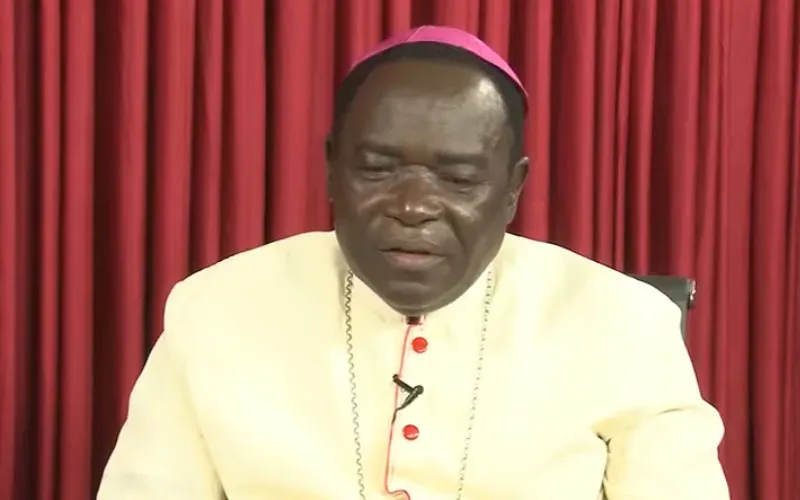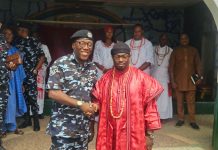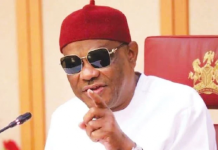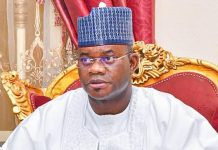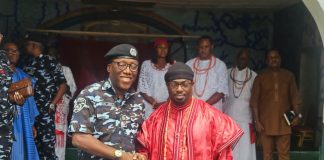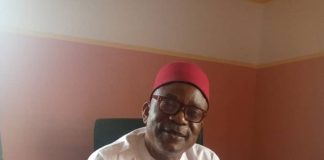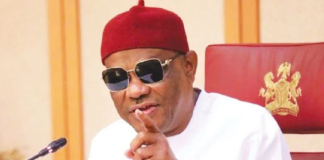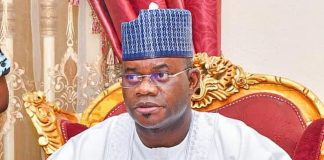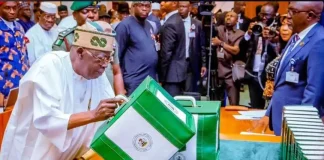🌿 Ruzu Non-Alcoholic Herbal Bitters
Ruzu Non-Alcoholic Herbal Bitters is a natural health supplement specially formulated to:
- ✅ Promote general wellness
- ✅ Detoxify the body
- ✅ Support the treatment of various ailments
Made from a powerful blend of 100% organic and medicinal herbs, Ruzu is completely alcohol-free, making it ideal for:
- 👪 All age groups
- 🌱 Health-conscious individuals
- 🌿 Anyone seeking non-alcoholic herbal remedies
Whether you're looking to boost your vitality, cleanse your system, or support healing the natural way, Ruzu Bitters offers a trusted herbal solution.
The bishop of the Sokoto Catholic Diocese is Matthew Hassan Kukah. He discusses Nigeria’s 65th anniversary of independence in an interview that was shown on Arise TV, highlighting how the military invasion has been the country’s biggest setback. In addition, the priesthood discusses illiteracy and poverty in Northern Nigeria. These portions are provided by Joy Anibogu:
The dawn of a new era began 65 years ago. What do you recall about the period following Nigeria’s independence from the British? Was it one of optimism, self-assurance, and faith in this nation?
My own was years of innocence, as I now see. Although I can’t recall, I believe I was around five or six. I’ll tell you what I recall, though. I had seen a priest for the first time. It turned out that the second white person I had ever seen was a clergyman. We therefore didn’t understand our headmaster when he told us about these awful white people who had colonized and invaded our land. And I had not seen any other evil white guy, so I couldn’t conceive. However, I found that the most memorable element of the October 1st celebration was when I received the first cup I could call my own. As part of the festivities, we were handed small cups. I was therefore unable to square the cycle as a child. Returning to our current situation, however, I find that every time I play the recording of Tafawa-Balewa’s life and listen to his remarks, I cannot help but cry. Additionally, Washington praised this man. In order to highlight the direction that the rest of the world perceived Nigeria taking, Time Magazine named this man the first African head of state and named him man of the year. Unfortunately, the first military coup ended in a suicidal expedition. And that is where the crime was committed, in my opinion, both then and now. Therefore, if you’re wondering why Nigeria is in this situation and where we’ve come from, that’s where we lost our innocence.
Was it clear to anyone who bothered to look in 1960, before the coup and all the rest of it, that Nigeria was a country with a diverse population of ethnic groups, religions, and geographical divisions, and that anyone attempting to govern it would only succeed if they could manage that diversity?
That is, in my opinion, a really good point. In all honesty, however, the equipment was already in place. All we wanted to do as children, I recall, was to observe the Sardauna’s appearance. They also carried these screens about my small community, displaying various items to us. We had everything that was good. Next came a bureaucracy that was genuinely unaware of some of the issues that have now come back to plague us, such as religion, ethnicity, the hegemons, and so on. We therefore have what we required. And when people ask us why Nigeria isn’t like Singapore, we respond with this. Why don’t we behave like Japan? The fact remains that we had the potential to surpass Singapore. We were capable of surpassing Malaysia. Had the military not intervened, we could have literally been better off since we already had a bureaucracy in place, and nobody would have been against us. While Lee Kuan Yew performed a remarkable job, he is not the reason Singapore is the way it is. But it’s that bureaucracy that was inherited. Additionally, the breakdown of society and the bureaucracy’s devastation intensified. Then consciences and ethnic identities started to show. I can also tell you that the majority of northerners in their 70s and 80s still find it difficult to accept the ruthless murder of the Tafawa-Balewa and Sardauna. I regret to inform you that our nation dislikes facing the facts. Forgiveness and forgetfulness are common African sayings. Despite the handle being outside, we bury the hatchet. Accordingly, I believe that we have not had the time, the integrity, or the sincerity to sit down at the table and ask, “Look, what went wrong?” And for this reason, the aspirations of our founding fathers have turned into our nightmares. And suddenly we found ourselves in a predicament where, whether it was for the bureaucracy or the public life, the hiring process collapsed. We can, I believe, explain why we are in this position now.
You discuss the anguish the North felt after the deaths of the Sardauna and Tafawa-Balewa. All sides have paid a heavy price in blood, though.
Indeed, but as you can see, there is elite conspiracy and hypocrisy, which holds that Nigeria has simply devolved into a carcass and that everyone attends meetings with long knives. Additionally, individuals are curious about the slices they are returning to their local communities. Thus, our national identity has actually vanished from view. Additionally, I speak about this with the utmost respect for the military and those who have led this nation. It’s not about good or bad soldiers, though. The military never should have gotten involved in politics in the first place. It has now been documented in book after book that they even beat the soldiers. At this point, it is evident to everyone why we are not like Malaysia. Why don’t we behave like India? I tell them that no military coup has ever occurred in any of the Asian nations they listed. None of them, and once all of this took place, keep in mind that the military itself turned into a dysfunctional organization tainted by ethnic maggots. At this point, people started planning coups based on goals that were not necessarily national in nature, but rather on collective interests. Additionally, two things always occur whenever we take a step in that direction. First, there can be no good or bad rape, according to morality. I say this because I am a priest. A decent rape is impossible. To pull a gun, shoot someone, and seize control is the same as being an armed robber.
Sixty-five years have passed. The events that have occurred have taken place. After everything you’ve said, what do you think makes this country what it is today?
Mythology is the focus of nation-building, not fact. Today’s America is a myth. Nigeria hasn’t had the aptitude or capability to dream, though, as you can see. For instance, following the 1960 speech, I’ve always told people to close their eyes and ask yourself whether they’ve ever heard a Nigerian president’s speech that blew them away. Or perhaps there’s a speech, such as JFK’s 1963 speech, that is so unforgettable that you think, “What was I doing?” The question of what the intellectual content of governance is is addressed by that. Given what the military did and what intellectuals like Wole Soyinka have to say about it, it is clear that once the soldiers saw they were losing the intellectual debate, they were scaffolding and prevented intelligence from taking over. People were so teaching things for which they were not compensated, as they stated. Okay, so once you ruled out intelligence, it meant that the whole question of imagination was irrelevant. Aristotle and Plato, for example, were not idle because people were thinking and every organization, including Nikon, was considering their next move. Not everyone who has an idealized vision of what a great hotel should look like is present. Therefore, research and development is always a crucial part, but those individuals are always hidden. And once you made the decision to establish your own business, a lot of people ask you, “Where do we begin?” The middle class in Nigeria is not always measured in Naira, even though some people claim that it has collapsed. What is up here is also what is meant by middle class. For this reason, I believe that the intellectuals’ contribution to policy and their rejection are largely to blame. Government representatives are making an effort, but it’s as best they can. And sometimes you come across someone, like a professor, who is possibly composing a speech for the state’s first lady. Some professors find themselves in situations where they are so limited that they are unable to explore the boundaries of their creativity for fear of losing their careers. As Plato stated, a nation cannot develop if it lacks the type of society in which intellectuals, legislators, and policy implementers are present.
Given all the criticisms you’ve listed, what is the enduring inspiration of your life in Nigeria as you evaluate this nation and look to the future, fully conscious that we’ve missed the boat that sailed in 1960, as you accurately analyzed?
I am a man of hope, and I thank God for that. I often tell myself that God created me a priest out of his boundless mercy. I would have been living on the streets by now, and I would most likely be dead. How much injustice you can tolerate is a limit. Fortunately, I’m quite lucky. I aspire to be a good student, but I put in a lot of effort. In addition to my schooling, the second—and possibly most significant—factor is that I received my education on the streets. I’ve had incredibly good fortune. I’ll get to see the Obi of Onitsha’s palace. I’ll be allowed to enter the Sultan of Sokoto’s palace. Only the day before yesterday did we spend time together. Kano’s Emir will let me tour his palace. I’m going to the former president’s mansion. I don’t take anything for granted, so I have that exceptional quality. But I’m also well-founded since my experience as a priest has given me a great understanding of the impoverished. I can see, however, that this is not a nation of evil people. Despite those in positions of authority, many good people permit evil things to occur, primarily due to the hiring process. Without any preparation, far too many people are now in positions of authority.
There, you made a comment regarding the impoverished. What drives you is your anger at the egregiously limited opportunities for success that people born in Nigeria currently face, or is it the recollection of the poverty you witness on a daily basis?
What a remarkable nation. Because I travel the world, people ask me. A lot of people ask me where I have the guts to speak against this dog-gone nation. You haven’t seen anything yet, man, I said. I have the utmost pride in our nation. I also know what others have done with just their hands and their own hands. Alright, I head eastward. My journey is to the west. My travels have taken me all across this country. What is missing? is similar to a man who has an amazing eleven-player ensemble. All OK, but the coach isn’t trying to figure out who should play or who should be benched at what moment. It is our intelligence that has become a source of envy in Nigeria. Consequently, you should avoid discussing your first class, for instance.
Considering what you observe, what do you think your purpose in this country is? Is it to try to persuade the government to be more understanding of such deprivation and to provide better services, to address the obstacles to a respectable quality of living, or something else entirely?
Let me just give you an example of what just occurred in Sokoto to address your question. President Olusegun Obasanjo and the Sultan of Sokoto were brought to the Catholic facility by me. We also turned on 250 laptops in a hall. This is because I’ve been told that there are 10 million, 20 million, and 25 million Almajiris. In ten years, they will be thirty and forty years old if they are currently ten, fifteen, or twenty years old. Every count begins with a single number. So long as I can remove just one person from the line, that’s sufficient in my opinion. I encounter young people everywhere I go, trust me. Several times, I have met them. In Sokoto, I can still recall being late to a flight. In some way, I was only a few seconds. My phone was gone, and then I realized. The pilot literally bent down to meet me as I arrived at the aircraft, where he was strolling around. I replied that I had forgotten my phone when he said, “I see you are looking very worried.” Where? he asked. Let him have your phone. My driver will be there in a little while, I said. We will wait for you, he said. And I felt ashamed. What did the captain say to me when I got on the plane? I caught the pilot’s attention. He said that more than ten years ago, you were the one who submitted a letter of recommendation that landed me a pilot’s position. You’ll forget who I am. I’m walking toward the same airplane in order to catch a flight. “I was your altar server when you were in Lagos,” the pilot says, kneeling in front of me. I have never attempted to exaggerate what I believe other people think of me, which is what I’m saying after a long journey. I mean, out of everything I’ve written, the biggest surprise for me was realizing that people were actually reading what I had to say. Additionally, I’ve made an effort to understand that although it’s crucial to pound the streets, we also need to provide a space for negotiation.
As a Catholic bishop, what changes do you believe have occurred in the relationship between Islam and Christianity since the 1960s?
I have a lot of anecdotes to share with you, but one of my favorites is about how I was in the lounge at the Abuja airport and had never met John Pepper Clark. I had never laid eyes on him before. That’s John Pepper Clark, someone said, so I got up to go say hello. “This is Bishop Kukah,” someone said, referring to him as the Catholic bishop of the Diocese of Sokoto. I was going to shake hands with John Pepper Clark when this dude appeared out of nowhere. I was surprised by him. When I told him he was Agbada, he would practically separate our hands. He advised against calling him the Catholic Bishop of Sokoto. In Sokoto, he is our Bishop. Not the Catholic Bishop, that’s for sure. He’s not only for Catholics, though. Such situations might also evoke feelings of nostalgia for the way things have gotten worse.
What we did at Sokoto was to publicly state that many of the ministers and the people we are calling Almajiri now are Almajiri at some point. But only because you had a chance. “Now,” I added, “I firmly believe that one of these Almajiris is Einstein. I have to make that kid an opportunity. I am aware of what is likely to occur, though. Because Bishop Kukah created this, some merchants whose children live elsewhere will tell you that it’s only for Christians. Going there makes you a Christian. Thus, you know, we haven’t yet, and our tribe is expanding. Considering that there are currently 25 million of these uneducated youngsters, who will go on to have children of their own. You can be anywhere from 10 to 50 or 40 children, as you are aware, in Northern Nigeria. Currently, this nation is not growing. Take a look at the Bureau of Statistics’ multifaceted study on poverty. just for the previous month. 90 percent are in Sokoto, while 85 percent are in Zamfara. All of the regions that border this country’s far north, where Muslims predominate, are tainted with poverty, neglect, and destitution; there is no other explanation for why they have turned into crime scenes in the present day. Therefore, I’m not a state, but I also don’t want the state to do everything, so I’m just saying that if we can all contribute in some small way, that’s great. The biggest problem facing Northern Nigeria and all the governors is opening the doors and then figuring out how we can work together.

